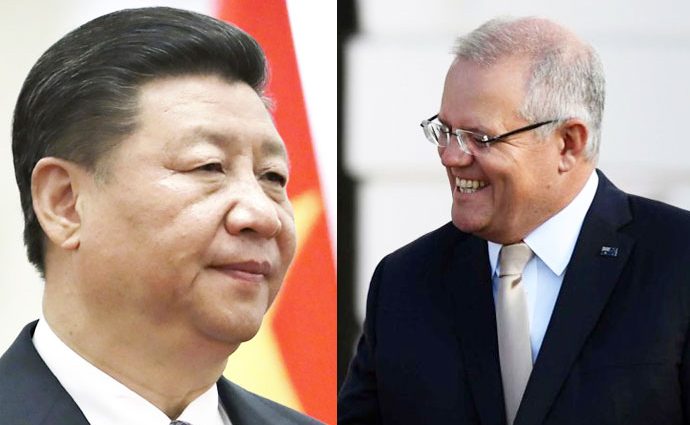Australian Prime Minister Scott Morrison is an interesting political character. He has demonstrated great skill in the art of election campaigning and his victory over Bill Shorten and the Labor party in the 2019 election was proof of this ability. Morrison does a good job as coming across as an ordinary sort of guy who likes going to the football and who seems to care about his family. His demeanour gives him the aura of having the common touch. He has a great penchant for talk: when confronted with an issue, Mr Morrison likes nothing better than to give a fulsome narrative about what his government will do about it. He also has a tendency to react to issues, so that, when an official in the foreign affairs department in the Peoples’ Republic of China tweeted a fake image of an Australian soldier committing an atrocity, Mr Morrison wasted no time giving vent to his outrage on behalf of the nation.
The problem for Mr Morrison is that, while he is strong on symbolism and rhetoric, he and his government are very weak on being able to make good public policy. The recent COVID 19 crisis that has blighted Australia is a case in point. Having been confronted with the reality that COVID-19 infections were occurring in Australia mainly as the result of international travellers bringing the virus to Australia, the Morrison government sought to work with the six states and two territories to co-ordinate the national response. This would result in the states being in charge of the so-called hotel quarantine programme.
As it turned out, this was a poor policy choice. By contracting this task to the states, the national government’s approach was bound to be blighted by two serious problems. First, such an approach could never result in a single national policy on COVID-19. What Australia got was nine different policies with nine sets of officials running around saying things that sometimes contradicted each other. What was more, the states all turned on each other and started to impose border restrictions that looked suspiciously as if their significance lay in their symbolism rather than acting as a constraint on virus transmission. At one point the prime minister appealed for unity and asked for the borders to re-open – a request that was refused and left the prime minister looking impotent and somewhat foolish.
The second problem with Morrison’s new federalism was that the handing over of responsibility for dealing with COVID-19 to the states meant that the national response would be affected by structural and political problems occurring at the state level. Victoria was a case in point, especially when that state’s management of hotel quarantine failed.
Whilst the inquiry in to this failure set up by the Victorian government (not the federal government) has yet to release its final report (somewhat cynically, this is due to appear two days before Christmas), the hearings thus far have exposed a number of issues pertaining to the problems in the way Victoria is governed. Clearly more effort went in to slogans and public advertising than in to managing hotel quarantine. Clearly the public service was too scared to tell ministers that their policy approach was problematic. Clearly the public service bureaucracy is too big and unwieldly. Clearly senior public officials – be they ministers or bureaucrats – had a problem with telling the inquiry the truth about their role in the policy. And clearly the refusal of the Victoria police to oversee the quarantine sits at the heart of the Victorian failure. This also hints at an unfortunate political reality in which police command is beyond the power of elected politicians.
What the Morrison government should have done was use its constitutional power over quarantine (see Section 51) and take the lead in the COVID policy. It should have told the states and territories what to do. There should have been only one national policy response to COVID-19. The problem is, this would have required the Morrison government to demonstrate an ability to make careful, well thought out policy. So far, there is no evidence to suggest that the Morrison government has this capability.
Also read: The China Paranoia in Australian Politics
Indeed, with the COVID crisis receding, a new – and possibly bigger – crisis in Australia’s relationship with the China has emerged. China has always presented Australian foreign policy with a challenge. On the one hand, the close economic relationship has been a boon for the Australian economy. This relationship buttressed Australia against the global financial crisis and it has provided the basis of Australia’s current prosperity. Its importance should not be under-estimated.
Running counter to this, however, are Australian suspicions about China’s geo-strategic ambitions. Australia sides with the US, with Japan and India along with other states in regarding China as an expansionist power that needs to be countered.
Management of Australia’s China policy is thus about balance and requires great delicacy and skill in its formulation and execution. So far, Mr Morrison’s constant reaction to events, complete with angry bluster, is the antithesis of what is needed. Morrison may well be giving voice to the nation’s outrage at the behaviour of the Chinese communist regime, but it is debatable as to whether it is either effective or indeed helpful to the long-term national interest. Rather like its response to COVID-19, the Morrison government’s approach lacks depth and thought and resonates as reaction. It is poor policy making – and that may be the enduring epitaph for the otherwise successful Morrison prime ministership.
Similar Posts by The Author:
- Missing the point in Bridget McKenzie Sports Funding controversy
- The China paranoia in Australian politics
- Minor party politics:Putting One Nation into perspective
- BANKING INQUIRY HITS COMPANIES, BUT WILL IT HURT THE GOVERNMENT?
- Turnbull Government ends the Year with a Flourish, but still behind in the Polls

